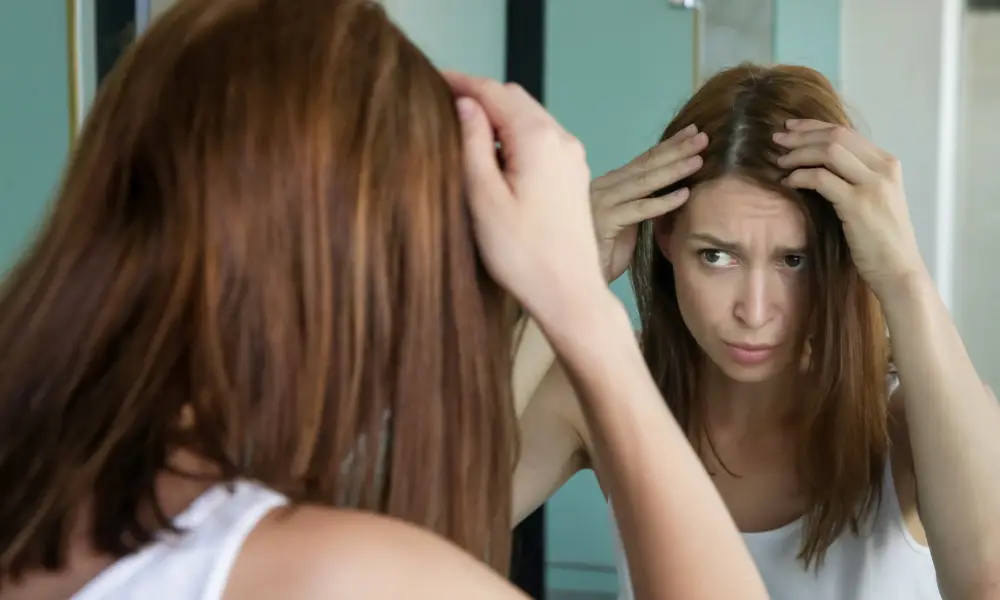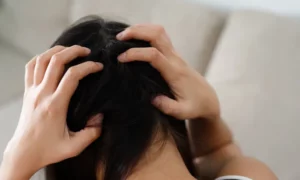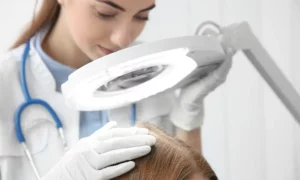Polycystic Ovary Syndrome (PCOS) is a common hormonal disorder affecting individuals, with one of its notable impacts being hair growth. In this article, we will delve into the intricacies of PCOS-related hair growth issues and explore the pcos hair growth medication and treatment approaches in detail.
Contents
What Are PCOS Hair Growth Issues? 
Polycystic Ovary Syndrome (PCOS) is a hormonal disorder that affects people with ovaries, often during their reproductive years and significantly affects the hair growth of women in different ways. Here are some details about PCOS-related hair growth issues:
- Hirsutism
This refers to the abnormal growth of coarse, dark hair in areas where men typically grow hair, such as the face, chest, and back. Hirsutism is a result of elevated levels of androgens (male hormones) in individuals with PCOS. These hormones can stimulate the hair follicles in certain areas of the body, leading to increased hair growth.
- Scalp Hair Changes
While excessive hair growth (hirsutism) is common in some areas, individuals with PCOS may also experience changes in scalp hair. This can include thinning of the hair on the scalp, known as androgenetic alopecia or male-pattern baldness. This is influenced by the same hormonal imbalances seen in hirsutism.
- Male-Pattern Hair Loss
PCOS can contribute to the development of male-pattern hair loss, where individuals may experience a receding hairline or thinning of the hair on the crown of the head. This is again linked to elevated androgen levels.
- Insulin Resistance
Insulin resistance is often associated with PCOS, and it can contribute to both hirsutism and hair loss. Insulin resistance may lead to increased production of insulin, which in turn can stimulate androgen production.
- Impact on Emotional Well-being
The physical changes in hair growth patterns can have a significant impact on the emotional well-being and self-esteem of individuals with PCOS. Addressing these concerns may involve a combination of medical and cosmetic interventions.
Popular PCOS Hair Growth Medications
Several medications are commonly prescribed to manage hair growth issues associated with Polycystic Ovary Syndrome (PCOS). It’s important to note that the choice of medication depends on individual factors, and a healthcare professional will tailor the treatment plan based on specific symptoms and needs. Here are some popular medications used to address PCOS-related hair growth issues:
Anti-Androgen Medications
Spironolactone: This medication is an anti-androgen that can help reduce the effects of androgens on the hair follicles. It is commonly used to treat hirsutism and can also have a positive impact on scalp hair thinning.
Flutamide: Another anti-androgen, flutamide, is occasionally prescribed to manage hirsutism in women with PCOS. It blocks the action of androgens at the cellular level.
Minoxidil
How it works: Minoxidil is a topical solution or foam that is applied directly to the scalp. It is thought to increase blood flow to the hair follicles, promoting hair growth.
Usage: It is available over the counter and is often recommended for both men and women experiencing hereditary hair loss (androgenetic alopecia).
Finasteride
How it works: Finasteride is an oral medication that works by inhibiting the action of the hormone dihydrotestosterone (DHT), which plays a role in hair loss.
Usage: It is typically prescribed for men with androgenetic alopecia. Women of childbearing age are usually advised not to use finasteride due to potential risks during pregnancy.
Platelet-Rich Plasma (PRP) Therapy
How it works: PRP involves drawing a small amount of the patient’s blood, processing it to concentrate platelets, and then injecting the PRP into the scalp. Platelets contain growth factors that may stimulate hair follicles.
Usage: PRP therapy is used for various types of hair loss, including androgenetic alopecia and certain cases of alopecia areata.
Low-Level Laser Therapy (LLLT)
How it works: LLLT uses low-level lasers or light-emitting diodes to stimulate hair follicles and promote hair growth.
Usage: LLLT can be administered through devices such as laser combs, helmets, or caps. It is often used as an at-home treatment for various types of hair loss.
Prescription Shampoos And Topical Medications
How they work: Medicated shampoos and topical solutions may contain ingredients like ketoconazole, corticosteroids, or other compounds to address specific scalp conditions or promote hair growth.
Usage: These are often recommended as adjunctive treatments for various types of hair loss.
It’s important to note that the effectiveness of these interventions can vary among individuals, and results may take time to become noticeable. Before pursuing any hair restoration treatment, it is advisable to consult with a healthcare professional or a specialist in hair disorders to determine the most suitable approach based on the specific cause of hair loss and individual health considerations.
Considerations Before Using PCOS Hair Growth Medication 
Before using medications for hair growth related to Polycystic Ovary Syndrome (PCOS), it’s important to consider several factors and consult with a healthcare professional. Here are key considerations:
- Consultation with Healthcare Professional
Schedule a thorough discussion with a healthcare provider, preferably a specialist in hormonal disorders, to discuss your symptoms and concerns.
- Confirmed PCOS Diagnosis
Ensure a confirmed diagnosis of PCOS through medical tests, including blood tests for hormone levels and imaging studies.
- Understanding Specific Symptoms
Clearly understand your specific PCOS-related hair symptoms, such as hirsutism, hair thinning, or scalp changes, to tailor the treatment plan.
- Personalized Treatment Approach
Recognize that PCOS affects individuals differently, and your healthcare provider will create a personalized treatment plan based on your unique circumstances.
- Awareness of Medication Risks
Be aware of potential side effects and risks associated with PCOS medications; discuss these with your healthcare provider.
- Impact on Fertility and Contraception
If of childbearing age, consider the impact of medications on fertility and discuss family planning options with your healthcare provider.
- Consistency and Patience
Understand that successful management may require consistent use of medications over time; be patient and committed to the treatment plan.
- Healthy Lifestyle Choices
Complement medications with healthy lifestyle choices, including a balanced diet, regular exercise, and stress management.
- Regular Follow-Up
Schedule regular follow-up appointments with your healthcare provider to monitor progress, assess side effects, and make any necessary adjustments to the treatment plan.
- Individual Circumstances May Vary
Recognize that the information provided is general, and individual circumstances may vary; always seek personalized advice from a qualified healthcare professional.
Natural Remedies For Healthy Hair 
Maintaining healthy hair involves a combination of good hair care practices, a balanced diet, and lifestyle habits. Here are some natural remedies and tips to promote healthy hair:
- Gentle Hair Care
- Use a mild, sulphate-free shampoo and conditioner suitable for your hair type.
- Avoid washing hair too frequently, as it can strip natural oils. Opt for 2-3 times a week.
- Be gentle when wetting, washing, and detangling hair to minimize breakage.
- Natural Oils
- Coconut Oil: Massage warm coconut oil into the scalp and hair. Leave it on for a few hours or overnight before washing.
- Olive Oil: Apply olive oil to the ends of hair to moisturize and prevent split ends.
- Egg Mask
Whisk an egg and apply it to damp hair. Leave it on for 20 minutes before washing. Eggs are rich in proteins that can strengthen hair. - Avocado Hair Mask
Mash a ripe avocado and mix it with a tablespoon of olive oil. Apply the mask to damp hair and leave it on for 30 minutes before rinsing. - Green Tea Rinse
Brew green tea and let it cool. Use it as a final hair rinse after shampooing to promote shine and reduce dandruff. - Herbal Teas
Rinse hair with herbal teas like chamomile or nettle tea. These teas may have soothing and strengthening effects. - Scalp Massage
Regularly massage the scalp using your fingertips to stimulate blood circulation and promote a healthy scalp. - Avoid Heat Damage
Limit the use of heated styling tools, such as flat irons and curling irons, to prevent heat damage. - Protect Hair from the Sun
Wear a hat or use hair products with UV protection to shield your hair from the sun’s harmful rays. - Manage Stress
Practice stress-reducing activities like yoga, meditation, or deep breathing exercises. Chronic stress can contribute to hair problems.
Conclusion
In conclusion, managing PCOS-related hair growth issues requires a comprehensive approach that considers both traditional and modern solutions. By staying informed, seeking professional guidance, and embracing a healthy lifestyle, individuals can navigate the path to healthy locks with confidence.
If you are facing PCOS related issues, pcos treatment at HerMantra can help. Book your free trial online pcos treatment session now.





